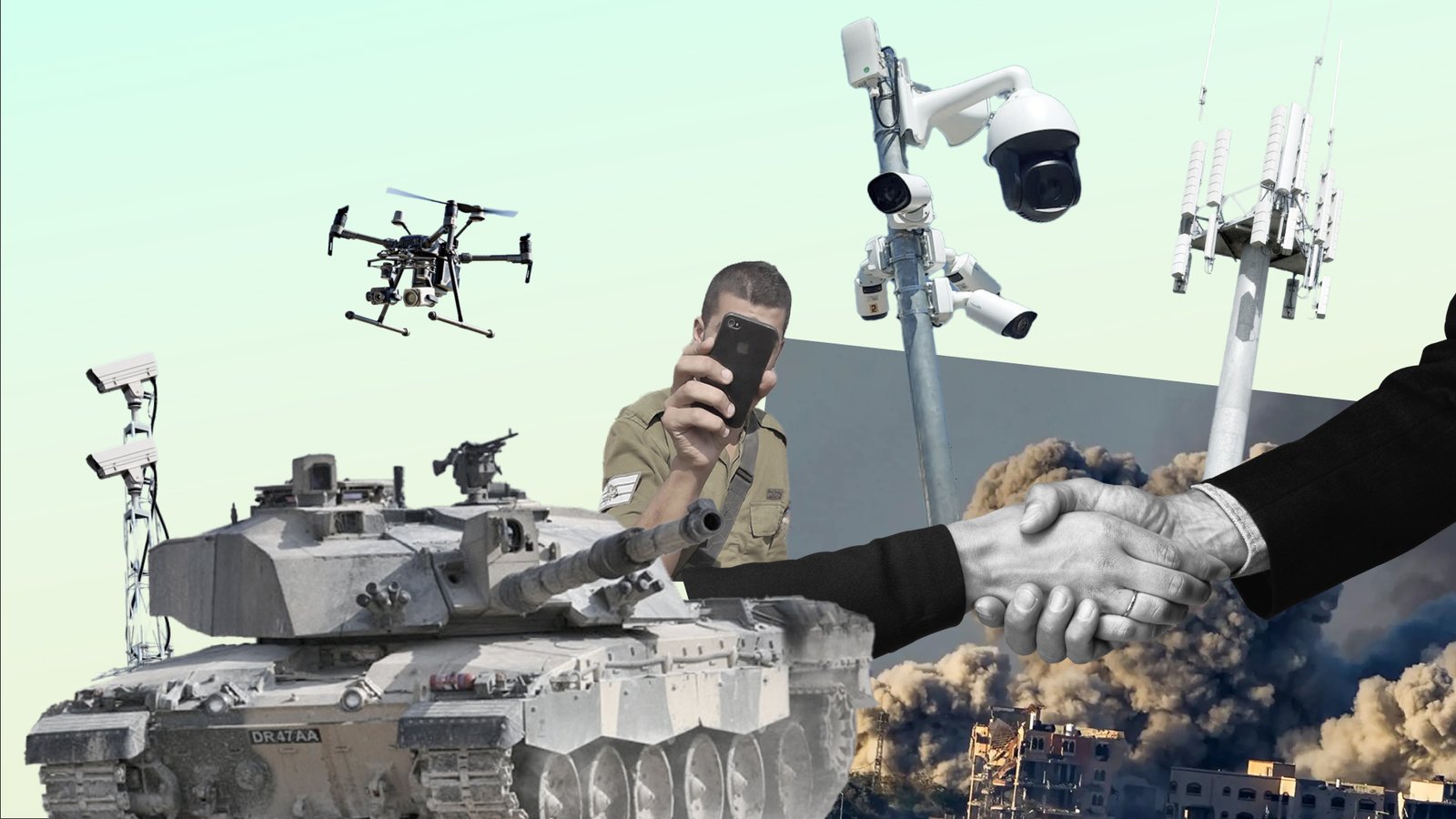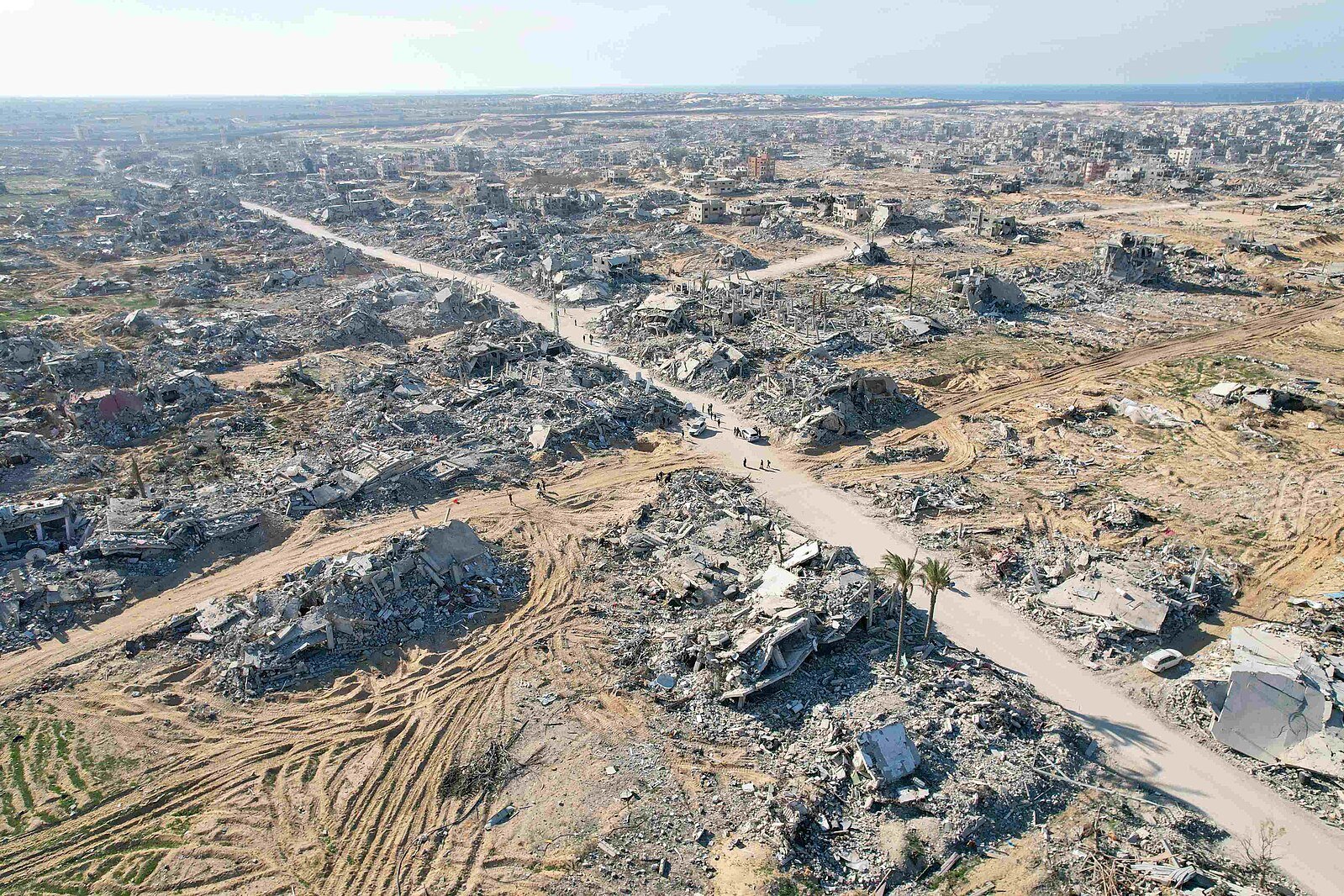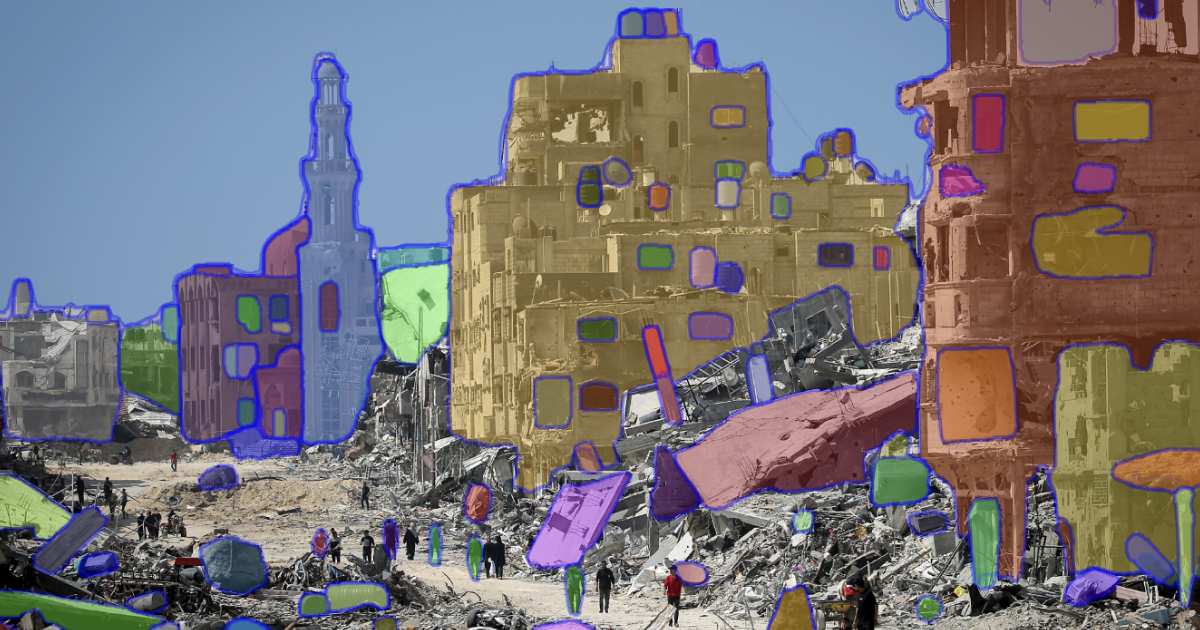From Algorithms to Atrocities: Israeli Tech-Supported Tyranny in Palestine and beyond
17. April 2025
The text is based on the discussion with Shir Hever, coordinator for the military embargo campaign of the Palestinian BDS movement, as part of Israeli Apartheid Week 2025.

Source: Danes je nov dan
Israel has since its formation in 1948 subjected Palestinians to invasive surveillance that infringes on their fundamental rights. But with harnessing increased computing capabilities, enhanced cloud services, and collection of enormous amounts of data, the Israeli military-industrial complex has been developing different technologies, such as AI systems and spyware, to further progress control over Palestinians and their land, entrench a system of apartheid, to surveil, repress and intimidate, and ultimately to unleash current genocidal killing spree in Gaza. But, even in the direness of the current situation, Shir Hever sees glimmers of hope.
Israel uses a multitude of different technologies of oppression to support apartheid and to surveil and kill. In the Occupied Palestinian Territories (OPT) of the West Bank and East Jerusalem, Palestinians are subjected to extensive biometric surveillance systems. Exercising this level of control is only possible because of the vast amounts of data that Israel has on Palestinians.
In today's digital age, everyone constantly generates data – not just through our voluntary interactions with the digital world but also when submitting an online questionnaire, being recorded by CCTV on the street, appearing in someone’s photo, or especially if a facial recognition technology captures, recognises and stores our image. All this creates data points that are owned by the companies or states. As data collection is becoming the default model of capitalism, we now live in an era of data colonialism, which functions by acquiring large-scale resources from which economic value can be extracted, thus turning people into data production farms that serve the Big Tech industry. But countries can also run the same model of data appropriation that enables them to extend great control over their subjects. And this is exactly what’s happening in Palestine.
The mass surveillance that Palestinians are experiencing is the most obvious and most dystopian representation of data colonialism, because it is actually done by a settler colonial state – Israel. Data is extracted regularly and on a mass scale from Palestinians against their will and used to repress them. The 2023 Amnesty International report Automated Apartheid uncovered some of the effects of such oppression on everyday lives of Palestinians where, for example, women are afraid to take off their hijabs at home because the cameras in the neighbourhood turn and capture the inside of their homes. The surveillance and consequent data collection culminates at the many (automated) checkpoints in the OPT that Palestinians have to pass on a daily basis. After submitting the required papers, having your bags, vehicles and your face scanned, you interact with a machine and you can be refused entry with no explanation. And because no reason is given, a person naturally wonders why they were denied. This type of automated decision making furthers the oppression and domination over Palestinians as they start changing their behaviour and policing themselves and others, adopting the oppressive mindset: “Maybe because my sister went to a demonstration, they're not letting me pass, so I will tell my sister not to demonstrate. Or, maybe my son wrote an article criticising the occupation, and he should not do that.”

Israeli checkpoint at Temple Mount. Wikipedia Commons.
The report also sheds light on the surveillance systems used in the West Bank – Blue Wolf, Red Wolf and Wolf Pack. Blue Wolf is used to collect data. Every IDF soldier is instructed to use the app via smartphones and to register as many Palestinians as possible, scan their faces and collect their biometric data. The gamified nature of the app is a powerful motivating force to collect as much biometric data as possible – potentially even more than the actual rewards, like extra vacation days, that the soldiers receive for the number of people they register. Red Wolf collects data from the stationary cameras with facial recognition, like the ones at checkpoints and in cities like Hebron or East Jerusalem where the majority of the streets are monitored by CCTV. Data gathered through both systems is channeled into a database – the Wolf Pack – that can be further processed, analysed and used against Palestinians with the use of artificial intelligence.
We have seen the horrific results of this type of data capture in Gaza since October 2023. Even if Israel on paper withdrew from the territory in 2005, data collection and consequent control over Gaza never stopped. Israel still controls the Gazan population registry with data on every single person, which started as a tool of oppression in 1967 and now grew into a tool that supports the annihilation and genocide. It also controls all the telecommunications. The data collection accelerated during the current assault, with camera-equipped tanks and stationary cameras mounted in Gaza, drone surveillance, facial recognition systems, spyware and telecommunications tapping, and scouring social media for information. The Israeli army, under the guidance of the 8200 Unit, IDF’s intelligence and surveillance unit, developed AI systems based on predictive analytics and is feeding this vast database into them. According to the reports, there are a couple of interconnected systems that we know are (or were) being used: Gospel, Lavender, Where’s Daddy, and Depth of Wisdom. Gospel generates a list of buildings and structures to target and destroy, Lavender generates human targets, Where’s Daddy? tracks those human targets and marks them for attacks when they are at home, and Depth of Wisdom maps Gaza’s tunnel network.
All these systems are part of the mass target factory with a focus on quantity and not quality. When producing human targets, Lavender assigns a score between 1 and 100 for every person in Gaza (including babies), assessing this person’s likelihood of being a militant. The higher the score, the more likely it is that Israel will put this person on their target list and justify their killing. What changed with the use of these AI systems is also the collateral factor – a number of bystanders or innocent civilians permitted to kill in order to kill the target. If the highest collateral factor before was around 15, now it’s closer to 20 for low-ranking militants and even 100 for supposed senior commanders. This means that the IDF made a decision to impose a collateral factor of almost 100 per target. Secondly, 40,000 highest scoring people were put on the target list. If we now calculate how many people were therefore targeted, multiplying the target list with the collateral factor, that amounts to 4 million people, which is more than 2.3 million Gazans. Meaning that every single person in Gaza is a legitimate target for Israeli attacks.

The scale of destruction in Rafah, Gaza. Wikimedia Commons.
AI certainly makes a big difference in the numbers of casualties and the scale of destruction. But not because of the technology itself, but because of the policies that are accompanying the use of AI. Contrary to the claims that the army is just executing the orders AI is giving, the staggering death toll is the result of the way Israel is using this technology. The abovementioned AI systems are creating recommendations and are actually designed to expand the number of targets, and not refine them. The use of technology has therefore loosened the rules as it conveniently detaches the executors from the execution, while it’s simultaneously being used as an excuse, an absolvement of responsibility.
However, Israel couldn’t do all of this alone. The surveillance and targeting systems need data, and this data needs to be stored on cloud storage. Tech infrastructure is a crucial element of the expansive surveillance network and the targeting machine – and it’s being provided to Israel by the Big Tech firms. Israel’s new cloud system Nimbus, which has been operating since August 2024, is provided by Google and Amazon. Within the cloud, even more Google’s technologies are available: they include AI capabilities such as face detection, object tracking, and sentiment analysis. Microsoft has also intensified its partnership with Israel after October 2023, with its cloud service Azure being used to support combat and intelligence activities, while also providing thousands of hours of technical support. This means that tech giants are willingly and knowingly offering their tools to support genocide.

Protester with banner Microsoft powers genocide. BDS Movement.
But the support for oppressive technologies that Israel is developing and using on Palestinians extends even further. Israeli private companies, most notoriously NSO Group that developed Pegasus, have been testing spyware on Palestinians and then selling it to other countries with the support of Israel, with European Parliament’s PEGA committee on spyware concluding that “it can be safely assumed that all Member States have purchased or used one or more spyware systems”. With the way spyware works, it’s impossible to treat it as a neutral technology that assists investigations. As Shir Hever descriptively puts it: “Spyware doesn't extract information from a phone. Spyware completely cracks open the phone, takes control of the phone, creates a clone, and everything that you do to the clone, happens to the original phone.” This means that data found on the investigated phone could either belong to the user or have been planted. There is no way to know. As this makes the gathered data inadmissible in courts, we can safely conclude that spyware is used solely to violate human rights, and to intimidate. Surely some countries have developed their own spyware technologies (e.g. NSA in the US), but Israel is the only country actually marketing and selling it to others, and not necessarily just countries. When dangerous technology, like Pegasus, is being sold for profit, its use for nefarious purposes becomes very tempting. The EU seems to be aware of the danger, as the PEGA committee proved, and there were intentions to curb the use of spyware in the Parliament, but some Member States have opposing plans.
Israel's military-industrial complex, developing and deploying technologies such as surveillance, AI warfare, and spyware, has carved out a niche as a startup nation producing urban warfare solutions for counterterrorism and securitisation. By marketing these technologies as battle-tested, Israel has capitalized on global demand, fueling an industry built on conflict and oppression. However, its ability to export such tools is not merely the result of innovation but is deeply dependent on the extensive military, economic, and political support it receives from the United States and other partners, which enables and sustains its agenda. With an increasing focus on militarisation and securitisation, accompanied by a growing defense budget, the EU is also now prioritising military objectives at the expense of the standard of living and vital social services. Through initiatives like Horizon Europe, the EU is channeling significant funds toward the development of advanced weaponry and oppressive technologies, often in partnership with Israeli universities and military companies implicated in these practices, and equipping itself with Israeli weapons, many of which have been “field-tested” on Palestinians.
Although the situation may seem daunting, there are ongoing initiatives and emerging solutions that offer concrete opportunities for actionable and tangible steps forward. Shir finds hope in these very moments, seeing a glimmer of possibility ahead. For example, due to the lack of ammunition, Israel was forced to adopt a strict weapons policy. This is because some governments are taking action and stopping or restricting arms trade with Israel due to legal problems, as well as pressure from the public. People taking direct action against arms companies and arms cargo (like blocking a ship in Spain that was carrying arms to Israel or closure of Elbit Systems factory in the UK) has proven successful too. Even though limited, military embargo and consequent lack of arms have also induced irrational responses from the Israeli government; the recently passed annual budget proposes investment of tens of billions of dollars in own arms manufacturing for which they don’t have the means nor capacities. Without the political and economic ties Israel has with various countries, among them also the EU and its Member States, Israel's military wouldn’t be able to carry out its current genocide, and its settler-colonial apartheid regime would struggle to remain viable. That’s why now is no time to despair, but to continue to educate ourselves and others, join collective actions and movements, like BDS (Boycott, Divest, Sanction), reinforce our advocacy and our calls to ban arms trade with Israel with national military embargo campaigns, and stop the use of technologies of oppression, like spyware, within the EU.
Worth your attention
Invitations, tips, suggestions, and warnings

23. August 2024

